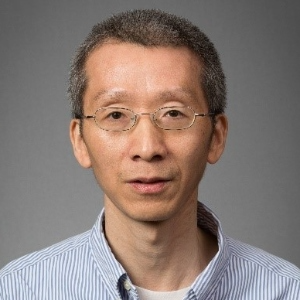Enrico Paris, CREA-IT & DIAEE, Italy
The selection of suitable bed materials in fluidized bed gasification (FBG) plays a crucial role in optimizing the process. Ideal bed materials must balance economic feasibility, thermal resistance, and minimal chemical interaction with biomass. However, the chemical interactions [....] » Read More



















Title : Application of vanadium and tantalum single-site zeolite catalysts in catalysis
Stanislaw Dzwigaj, Sorbonne University, France
The metal ions well dispersed at zeolite framework are considered to be active sites of catalytic processes. Therefore, the incorporation of these metals into zeolites as isolated tetrahedral sites appears to be the important task. We have earlier shown that the incorporation of [....] » Read More
Title : 30,000 nano implants in humans with no infections, no loosening, and no failures
Thomas J Webster, Interstellar Therapeutics, United States
Implant infection is rising with the U.S. Centers for Disease Control predicting one person every three seconds will die from a bacteria infection by 2050. Nanomedicine is the use of nanomaterials to improve disease prevention, detection, and treatment which has resulted in hundr [....] » Read More
Title : Personalized and Precision Medicine (PPM) as a unique healthcare model through biodesign-inspired & biotech-driven translational applications and upgraded business marketing to secure the human healthcare and biosafety
Sergey Suchkov, R&D Director of the National Center for Human Photosynthesis, Mexico
Traditionally a disease has been defined by its clinical presentation and observable characteristics, not by the underlying molecular mechanisms, pathways and systems biology-related processes specific to a particular patient (ignoring persons-at-risk). A new systems approach to [....] » Read More
Title : Solar heterogeneous photocatalysis and photochemistry for urban wastewater regeneration and reuse
Isabel Oller Alberola, Plataforma Solar de Almería, Spain
Water scarcity, inadequate sanitation and the socioeconomic gap between urban and rural areas represent significant barriers to sustainable development and promote disparities regarding access to resources, opportunities and basic services. Addressing the world water crisis, conv [....] » Read More
Title : Antibody-proteases as translational biomarkers, targets and potential tools of the next step generation as applicable for design-driven personalized and precision medical practice
Sergey Suchkov, R&D Director of the National Center for Human Photosynthesis, Mexico
Biomarkers as being a part of the ligand-receptor tandems have induced an impulse to prompt the development of an upgraded concept of the targeted therapy. So, the identification, impact and implementation of diagnostic, predictive and prognostic biomarkers of the next step gener [....] » Read More
Title : Cleaner syngas from biomass gasification: Is K-Feldspar the key?
Beatrice Vincenti, Sapienza University of Rome, Italy
The selection of bed materials in fluidized bed gasification (FBG) is a key factor in optimizing syngas quality and minimizing contamination. This work presents a pilot-scale comparison of olivine and K-feldspar as bed materials during the gasification of almond shells, a widely [....] » Read More
Title : Energy efficient propylene production by catalytic cracking of light naphtha over zeolite based composites
Shinya Hodoshima, Chiyoda Corporation, Japan
Propylene as a basic chemical becomes significant in petrochemical industry because of its increasing global demand. However, it is difficult to meet the increasing demand by conventional thermal cracking of naphtha feed due to its low propylene selectivity. Additionally, thermal [....] » Read More
Title : Natural gas as a transitional fuel for carbon emission reduction
Yousef Alroomi, KIPIC, Kuwait
In the ongoing global transition toward sustainable energy systems, natural gas has emerged as a key transitional fuel capable of significantly reducing carbon emissions. This paper explores how natural gas can serve as a reliable intermediary energy source, supporting the integr [....] » Read More
Title : Role of alkali earth metals in tailoring Ni/CeO2 system for efficient ammonia decomposition
Majed Alamoudi, King Abdulaziz University, Saudi Arabia
The global energy landscape is undergoing a significant transformation, driven by a growing imperative to shift away from traditional fossil fuels. Hydrogen, as an emerging clean energy source, confronts various technical challenges in storage and transportation, notably high cos [....] » Read More
Title : Selective catalytic reduction of NO by C3H6 over Cu(x)Co(y)Ce(z)O oxides derived from LDHs
Yaxin Su, Donghua University, China
Nitrogen oxide (NOx) emissions from stationary and mobile sources posd a serious threat to human health and the atmosphere air quality. Selective catalytic reduction (SCR) technology is widely employed to eliminate NOx due to its demonstrated high efficiency in converting NOx to [....] » Read More
Title : Bimetallic catalysts for the hydrogenation of amides: From experimental to data-driven insights
Jorge A Delgado, Syensqo, China
This work evaluates the impact of various parameters on bimetallic catalysts in the hydrogenation of amides to amines, using systematic experimental and data-driven methods. Bimetallic catalysts were synthesized via a sequential wet impregnation approach and tested on the hydroge [....] » Read More
Title : Heterogeneous catalysis: Reaction mechanism and kinetic models
Diya KV, Lovely Professional University, India
Majority of the processes in chemical industries requires the use of catalyst which indirectly contributes to the world GDP. Most of the catalytic processes are heterogeneous in nature which forms the foundation of modern Chemical Engineering. Heterogeneous catalysis plays an imp [....] » Read More
Title : Application of solid waste materials for adsorptive removal of toxic phenol from wastewater to protect environment and also to generate circular economy
Ashanendu Mandal, University of Calcutta, India
This research aims for adsorptive removal of phenol from wastewater by solid waste materials viz. guava tree bark, rice husk, neem leaves, activated carbon from coconut coir, rice husk ash, red mud, clarified sludge from basic oxygen furnace and activated alumina. The characteriz [....] » Read More
Title : Who gives the hydrogen? A mechanistic study through isotope labeling in photocatalytic hydrogen evolution reactions using cobalt complexes as a catalyst under neutral pH
Ladapborlang Mawrie, University of Science & Technology Meghalaya, India
The growing global demand for energy has led to the excessive exploitation of non-renewable energy sources, especially fossil fuels. This heavy dependence on such sources significantly increases CO2 emissions in the atmosphere, resulting in serious environmental repercussions. Th [....] » Read More
Title : FTIR and Raman spectral analysis on kerosene and crude oil-auldetration in gaselione, adverse effectcts on nature during production and trasportation
S R Varadhan, Independent Researcher, India
Crude oil is called as rock oil is gifted by the earth. But in return the same factor is adversely affecting her own rich and useful environment. In this connection, the oil spill in the sea and oceans has caused a great environmental impact on the entire marine eco-syst [....] » Read More
Title : Catalytic esterification for the efficient synthesis of phosphinic dipeptides and their acetylated glucose derivatives
Moaz M Abdou, Egyptian Petroleum Research Institute, Egypt
The successful synthesis of novel phosphinic dipeptides and their acetylated glucose derivatives via an efficient esterification process is reported. Reaction of phosphinic dipeptides with 1,2,3,4-tetra-O-acetyl-β-D-glucopyranose (TGA) afforded carbohydrate-based phosphinic [....] » Read More
Title : Biosorption: A sustainable and practical effective technique for heavy metal reduction
Fatemehsadat Mirmohammadmakki, Shahid Beheshti University of Medical Sciences, Iran (Islamic Republic of)
Heavy metal pollution from industrial actions, mining, and agriculture poses a severe challenge to environmental health and safety. Toxic elements such as lead, cadmium, nickel, chromium, and mercury accumulate in ecosystems, posing long-term risks to biodiversity and human healt [....] » Read More
Title : The role of hydrogen in sustainable energy solutions
Sajjad Ali, Prince Sultan University, Saudi Arabia
Hydrogen (H?) technology is rapidly emerging as a cornerstone for achieving global energy sustainability, offering clean solutions for sectors ranging from transportation to industrial applications. This presentation will explore the multifaceted landscape of H? technology, begin [....] » Read More
Title : Computational prediction of an important protein’s structure
Angyang Yu, Central China Normal University, China
ß-lactam enzyme antibiotic is one of the most effective chemotherapy medicine in treating bacteria infection. Inhibitor of metal 2-lactam enzyme is an important topic in clinical medical science during the historic development of antibiotics in the past sixty years since th [....] » Read More
Title : Frame wok for industrial benchmarking in logistics centric activities through CRITIC analysis and KANO questionnaire
Mohammas Israr, Maryam Abacha American University of Nigeria, Nigeria
In today’s fast paced business environment, superior logistics performance is a prerequisite to become and stay competitive. Distribution and warehousing practices account for about 70% of total logistics while annual logistics expenditure is nearly 13% of the GDP in India [....] » Read More
Title : Synthesis and evaluation of styrene-based polymeric resin for glycerol acetalization: Effect of crosslinkers on swelling and catalytic performance
William Mendes Godoy, University of Sao Paulo, Brazil
This study presents the synthesis and evaluation of a styrene-based polymeric resin crosslinked with 2% TMPTA, compared to the commercial resin Amberlyst 15, which contains 20% of DVB as a crosslinker. The resins were assessed for their catalytic performance in the glycerol aceta [....] » Read More
Title : Sustainable advancements in polyurethane monomer synthesis: Green pathways from CO2 to isocyanates
Jin Hee Lee, Korea Research Institute of Chemical Technology, Korea, Republic of
The increasing demand for eco-friendly materials has driven the development of a sustainable process for synthesizing polyurethane monomers directly from CO2, addressing both environmental and industrial challenges. This process incorporates CO2 to avoid the use of toxic phosgene [....] » Read More
Title : Micro-wave synthesis of MnO2 for high-performance supercapacitor application
Makhloufi Mohamed Cherif, University of Boumerdes, Algeria
This thesis aims to improve the electrochemical performance of pseudocapacitive materials such as MnO2, for use as active materials in supercapacitors. Manganese dioxide was produced using two processes, hydrothermal and microwave, in order to obtain different structures. A signi [....] » Read More
Title : Microwave-enhanced CO2 reforming with C2+ gas mixture
Young Woo You, Korea Research Institute of Chemical Technology, Korea, Republic of
CO2 reforming is a promising technology that not only converts CO2 but also produces industrially valuable syngas within the framework of a carbon circular economy. However, current CO2 reforming primarily relies on CH4 as a reducing agent, leading to additional fossil fuel consu [....] » Read More
Title : Optimization of Fe3O4 nanoparticles loading on reduced graphene oxide nanosheets for the efficient removal of aqueous p-nitroaniline and Cr(VI)
Sourav Halder, Indian Institute of Technology Kharagpur, India
Herein, we demonstrate the hydrothermal synthesis of a Fe3O4 /RGO nanocomposite with an optimized Fe3O4 loading of 27% for the adsorptive removal of 4-nitroaniline (4-NA) and Cr(VI) from wastewater. X-Ray Diffraction and Raman analysis confirm the formation of inverse spinel Fe3O [....] » Read More